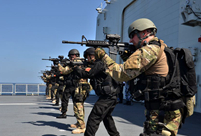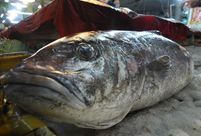MOSCOW, Dec. 21 -- Russia vowed Saturday to take retaliatory measures against a fresh round of punitive measures, after the United States and Canada followed EU steps to rachet up sanctions over Crimea and for what they say Russia's role in the ongoing Ukrainian crisis.
U.S. President Barack Obama on Friday signed an executive order, imposing a ban on new investment in Crimea and barring export or import of goods, technology or services with the region, which joined Russia after a referendum in March.
On the same day, Canadian Prime Minister Stephen Harper announced that Ottawa will introduce restrictions on the export of technology in relation to Arctic, deep water and shale oil explorations and extraction to Russia.
The sanctions came a day after the European Union unleashed similar sanctions on Moscow.
The latest moves by the U.S. and Canada served as evidence that the West lacks interest in settling the Ukraine crisis and the two countries, which claimed themselves democracies, resort to "collective punishment" against residents who had voted to become part of Russia, the Russian Foreign Ministry said in a statement.
The United States and Canada still cannot put up with the results of free declaration of will in Crimea and Sevastopol, said Russian Foreign Ministry spokesman Alexander Lukashevich.
"Our advice to Washington and Ottawa is to think about consequences from actions of the kind ... And we shall work on retaliatory measures," he added.
Russian President Vladimir Putin also expressed defiance against the latest Western sanctions. "No one will succeed in intimidating us, to deter, to isolate Russia," said Putin at a ceremony honoring Russia's national security services staff.
The Russian economy, which is heavily dependent on oil export, has hit a rough patch recently due to falling oil prices, coupled with a sharply depreciating ruble.
While admitting the adverse impact of Western sanctions on the Russian economy, Putin said earlier in his annual press conference that it would take at most two years for the Russian economy to rebound under the most unfavorable scenario.
Away from the economic arena, it seems the Western sanctions have so far failed to produce any result in bringing an end to the Ukrainian crisis, which has claimed at least 4,707 human lives since mid-April, according to the latest data by the United Nations.
Starting with massive street protests to back the country's European integration in November, 2013, the crisis evolved into a government breakdown in February, as the elected President Viktor Yanukovych was removed from office by a parliament controlled by West-leaning opposition which favored integration with the EU instead of closer ties with Russia.
Tensions in Ukraine turned white-hot when a referendum was held in the country's autonomous region of Crimea in mid-March, in which the majority of the region's people voted to join Russia.
By mid-April, hostilities flared in eastern Ukraine as at least five other cities in the region were targeted by uprisings and the violent takeover of government buildings by independence-seeking rebels.X In September, a ceasefire agreement was reached by both sides in Belarussian capital of Minsk. However, a UN report said that at least 1,357 fatalities have been recorded in Ukraine's eastern regions since the ceasefire was declared.
Given the complex historical factors and the current circumstances behind the crisis, analysts say dialogue and compromise between Russia and the West as well as the warring parties in Ukraine are the only viable way to find solutions to the crisis.
Li Zhonghai, chief editor of The Studies on Russia, Eastern Europe and Central Asia by CASS, told Xinhua that a balanced approach to the crisis, should take into account the interests of all sides concerned and until then, Ukraine would stay stuck in its struggle to adjust its relations with major countries.
A chronic crisis in Ukraine might grow into a trigger for a new Cold War, Li warned.
 Joint anti-piracy drill
Joint anti-piracy drill Unknown 'monster' fish caught in Shandong
Unknown 'monster' fish caught in Shandong 20 years on: Relocated Three Gorges residents through lens
20 years on: Relocated Three Gorges residents through lens Beautiful Chinese woman
Beautiful Chinese woman Chestnut girl goes viral online
Chestnut girl goes viral online PLA HK Garrison veterans leave behind beautiful smiles
PLA HK Garrison veterans leave behind beautiful smiles Victoria's Secret Fashion Show
Victoria's Secret Fashion Show Representative beauties
Representative beauties Excellent photos of Zhuhai Air Show
Excellent photos of Zhuhai Air Show Thaw in US-Cuba ties offers broad lessons
Thaw in US-Cuba ties offers broad lessons China keeping close eye on ruble
China keeping close eye on ruble Macao’s relations with mainland strong despite Hong Kong protests
Macao’s relations with mainland strong despite Hong Kong protests Chinese literature steps up going abroad while online literature booms
Chinese literature steps up going abroad while online literature boomsDay|Week|Month